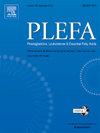Effects of long-chain omega-3 polyunsaturated fatty acids on reducing anxiety and/or depression in adults; A systematic review and meta-analysis of randomised controlled trials
IF 2.9
4区 医学
Q3 BIOCHEMISTRY & MOLECULAR BIOLOGY
Prostaglandins, leukotrienes, and essential fatty acids
Pub Date : 2022-10-18
DOI:10.1101/2022.10.17.22281092
引用次数: 0
Abstract
First-line treatment for anxiety and depressive disorders comprises pharmacotherapy and psychotherapy; options not safe, effective, or suitable for all. Mounting evidence suggests that the omega-3 polyunsaturated fatty acids (PUFAs) eicosapentaenoic (EPA), docosahexaenoic (DHA) and docosapentaenoic (DPAn-3) acids are promising therapeutic options. However, meta-analyses of randomised controlled trials (RCTs) have produced inconsistent findings. This review assesses for the first time the efficacy of omega-3 PUFAs against the severity of anxiety and depression symptoms, measured by validated scales, with specific consideration of methodological issues encountered in this area. PubMed, CINAHL, PsycINFO, Cochrane Library and Web of Science were searched for eligible RCTs administering omega-3 PUFAs against anxiety and/or depression. This study adopts the PRISMA guidelines. Ten RCTs comprising 1509 participants were included in the quantitative synthesis. EPA-enriched interventions at [≥]60% of total EPA+DHA were associated with significant reduction in depression severity, compared to placebo (SMD: -0.32; 95% CI: -0.59, -0.06; p=0.02); however, EPA doses of [≥]2000 mg/day were not (SMD: -0.11; 95% CI: -0.43, 0.20; p=0.48). Only 10 RCTs fulfilled the eligibility criteria, and there were some concerns regarding bias and population heterogeneity, highlighting the lack of high-quality RCTs in this area. Overall, these results support previous observations where EPA at proportions [≥]60% of total EPA+DHA, up to 2000 mg, reduces depression scores. However, more trials are needed which specifically consider the unique nature of this type of research to elucidate the therapeutic potential of EPA, DHA and DPAn-3.长链omega-3多不饱和脂肪酸对减轻成人焦虑和/或抑郁的作用随机对照试验的系统回顾和荟萃分析
焦虑和抑郁障碍的一线治疗包括药物治疗和心理治疗;并非安全、有效或适合所有人的选择。越来越多的证据表明,omega-3多不饱和脂肪酸(PUFAs)、二十碳五烯酸(EPA)、二十二碳六烯酸(DHA)和二十二碳五烯酸(DPAn-3)是很有前途的治疗选择。然而,随机对照试验(RCTs)的荟萃分析产生了不一致的结果。本综述首次评估了omega-3 PUFAs对焦虑和抑郁症状严重程度的疗效,通过有效的量表测量,并特别考虑了该领域遇到的方法学问题。PubMed, CINAHL, PsycINFO, Cochrane Library和Web of Science检索了使用omega-3 PUFAs治疗焦虑和/或抑郁的符合条件的随机对照试验。本研究采用PRISMA指南。定量综合纳入10项随机对照试验,共1509名受试者。与安慰剂相比,总EPA+DHA含量≥60%的EPA富集干预与抑郁症严重程度的显著降低相关(SMD: -0.32;95% ci: -0.59, -0.06;p = 0.02);然而,EPA剂量[≥]2000 mg/天则没有(SMD: -0.11;95% ci: -0.43, 0.20;p = 0.48)。只有10项rct符合入选标准,存在一些关于偏倚和人群异质性的担忧,突出了该领域缺乏高质量的rct。总的来说,这些结果支持了先前的观察结果,EPA占总EPA+DHA的比例[≥]60%,高达2000毫克,可以降低抑郁评分。然而,需要更多的试验来特别考虑这类研究的独特性,以阐明EPA、DHA和DPAn-3的治疗潜力。
本文章由计算机程序翻译,如有差异,请以英文原文为准。
求助全文
约1分钟内获得全文
求助全文
来源期刊
CiteScore
6.40
自引率
6.70%
发文量
60
审稿时长
13.2 weeks
期刊介绍:
The role of lipids, including essential fatty acids and their prostaglandin, leukotriene and other derivatives, is now evident in almost all areas of biomedical science. Cell membrane behaviour and cell signalling in all tissues are highly dependent on the lipid constituents of cells. Prostaglandins, Leukotrienes & Essential Fatty Acids aims to cover all aspects of the roles of lipids in cellular, organ and whole organism function, and places a particular emphasis on human studies. Papers concerning all medical specialties are published. Much of the material is particularly relevant to the development of novel treatments for disease.

 求助内容:
求助内容: 应助结果提醒方式:
应助结果提醒方式:


